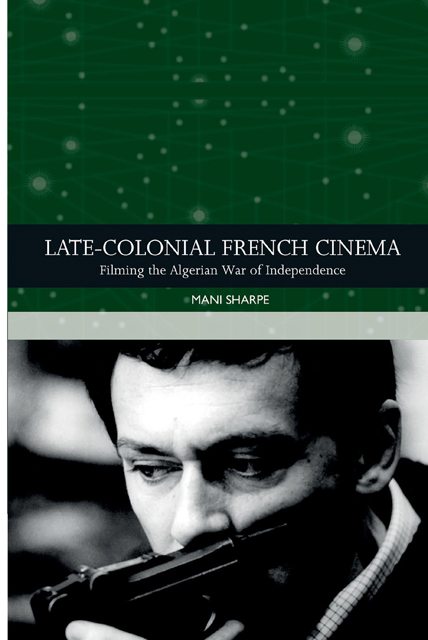Introduction
Published online by Cambridge University Press: 13 April 2023
Summary
One of the most famous examples of what I will be calling late-colonial French cinema is Alain Resnais’s 1963 Muriel ou le temps d’un retour/Muriel or the Time of a Return. An ostensibly mundane tale of middle-class routines, set in Boulogne-sur-Mer, a port-town made of jutting concrete and faded majesty, Resnais’s film derives its dark power neither from the pleasures of spectacle nor suspense that subtend the archetypal classical realist narrative, but rather from the jarring interplay that exists between its two central, and highly unconventional, protagonists. One of these is a neurotic ex-soldier named Bernard (Jean-Baptiste Thierée), who has recently returned from Algeria, the geographical site of the war that forms the focus of this book. The other is ‘Muriel’, a woman whom Bernard initially designates as a friend or potential partner, yet whose body and voice remain entirely un-visualised and un-vocalised within the diegesis. Not only that, but as the plot progresses, the spectator gradually learns – with trepidation, then horror – that ‘Muriel’ is likely to be little more than a pseudonym, grafted onto the dissolved identity of a female Algerian civilian, tortured and murdered by a group of French soldiers in Algeria, possibly including Bernard.
Considering its subtext of militarised torture, Muriel ou le temps d’un retour has frequently been interpreted as a pacifist film, an anti-state film, and an anti-colonial film: pacifist as it focuses on an act of military atrocity rather than an act of military victory; anti-state as it obliquely alludes to the insidious regime of official censorship in place in France at the time (see below); and anti-colonial insofar as it indirectly undermines the ideology of colonialism fuelling the war in which Bernard has fought (Greene 1999: 31–50; O’Brien 2000; Silverman 2013: 54–60; Flood 2017: 35–56). Focusing on Bernard’s antagonistic relationship with former soldier Robert (Philippe Laudenbach), other scholars, however, have proposed a subtly different interpretation of Resnais’s modernist conundrum, further complicating our understanding of it. Central to these alternative readings are the ways in which the film seems to gently exonerate Bernard from the military atrocities in which he is initially implicated.
- Type
- Chapter
- Information
- Late-Colonial French CinemaFilming the Algerian War of Independence, pp. 1 - 30Publisher: Edinburgh University PressPrint publication year: 2023

